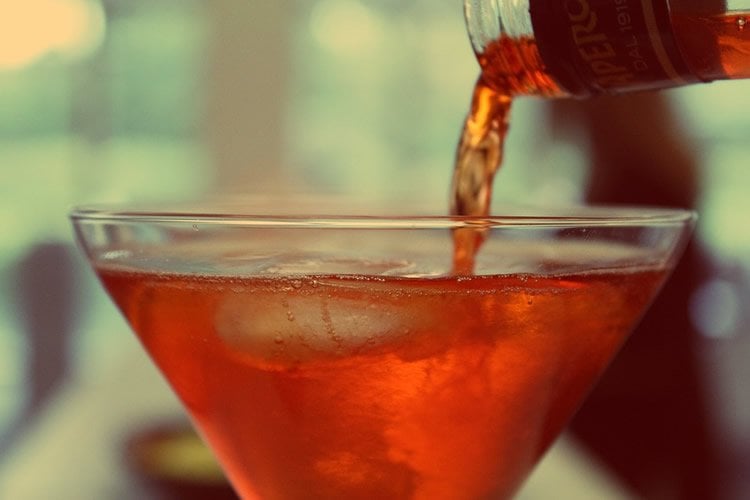Summary: Bilingual people show improved ability to speak in their second language after consuming alcohol, a new study reports.
Source: University of Liverpool.
A new study published in the Journal of Psychopharmacology, conducted by researchers from the University of Liverpool, Maastricht University and King’s College London, shows that bilingual speakers’ ability to speak a second language is improved after they have consumed a low dose of alcohol.
It is well-established that alcohol impairs cognitive and motor functions. ‘Executive functions’, which include the ability to remember, pay attention, and inhibit inappropriate behaviours, are particularly sensitive to the acute effects of alcohol.
Given that executive functions are important when speaking a second (non-native) language, one might expect that alcohol would impair the ability to speak a second language. On the other hand, alcohol increases self-confidence and reduces social anxiety, both of which might be expected to improve language ability when interacting with another person.
Furthermore, many bilingual speakers believe that it can improve their ability to speak a second language. The aim of this experimental study was to test these competing predictions for the first time.
Language performance
The researchers tested the effects of a low dose of alcohol on participants’ self-rated and observer-rated ability to converse in Dutch. Participants were 50 native German speakers who were studying at a Dutch University (Maastricht) and had recently learned to speak, read and write in Dutch.
Participants were randomized to consume either a low dose of alcohol or a control beverage that contained no alcohol, before they chatted with an experimenter in Dutch for a few minutes. The exact dose of alcohol varied depending on participants’ body weight, but it was equivalent to just under a pint (460ml) of 5% beer, for a 70kg male.
The chat was audio-recorded and participants’ foreign language skills were subsequently rated by two native Dutch speakers who did not know if the participant had consumed alcohol or not (observer-ratings). Participants also rated their own Dutch language skills during the conversation (self-ratings).
The researchers found that participants who had consumed alcohol had significantly better observer-ratings for their Dutch language, specifically better pronunciation, compared to those who had not consumed alcohol. However, alcohol had no effect on self-ratings of Dutch language skills.
Implications and Limitations
Dr Inge Kersbergen, from the University of Liverpool’s Institute of Psychology, Health and Society, who was involved in the study, said: “Our study shows that acute alcohol consumption may have beneficial effects on the pronunciation of a foreign language in people who recently learned that language. This provides some support for the lay belief (among bilingual speakers) that a low dose of alcohol can improve their ability to speak a second language”

Dr Fritz Renner who was one of the researchers who conducted the study at Maastricht University, said: “It is important to point out that participants in this study consumed a low dose of alcohol. Higher levels of alcohol consumption might not have beneficial effects on the pronunciation of a foreign language.”
Dr Jessica Werthmann who was one of the researchers who conducted the study at Maastricht University, said “We need to be cautious about the implications of these results until we know more about what causes the observed results. One possible mechanism could be the anxiety-reducing effect of alcohol. But more research is needed to test this.”
Funding: The study was funded by Maastricht University, the Netherlands.
Source: Simon Wood – University of Liverpool
Publisher: Organized by NeuroscienceNews.com.
Image Source: NeuroscienceNews.com image is in the public domain.
Original Research: Abstract for “Dutch courage? Effects of acute alcohol consumption on self-ratings and observer ratings of foreign language skills” by Fritz Renner, Inge Kersbergen, Matt Field, and Jessica Werthmann in Journal of Psychopharmacology. Published online October 18 2017 doi:10.1177/0269881117735687
[cbtabs][cbtab title=”MLA”]University of Liverpool “Dutch Courage: Alcohol Improves Foreign Language Skills.” NeuroscienceNews. NeuroscienceNews, 18 October 2017.
<https://neurosciencenews.com/alcohol-foreign-language-skills-7759/>.[/cbtab][cbtab title=”APA”]University of Liverpool (2017, October 18). Dutch Courage: Alcohol Improves Foreign Language Skills. NeuroscienceNews. Retrieved October 18, 2017 from https://neurosciencenews.com/alcohol-foreign-language-skills-7759/[/cbtab][cbtab title=”Chicago”]University of Liverpool “Dutch Courage: Alcohol Improves Foreign Language Skills.” https://neurosciencenews.com/alcohol-foreign-language-skills-7759/ (accessed October 18, 2017).[/cbtab][/cbtabs]
Abstract
Dutch courage? Effects of acute alcohol consumption on self-ratings and observer ratings of foreign language skills
Aims:
A popular belief is that alcohol improves the ability to speak in a foreign language. The effect of acute alcohol consumption on perceived foreign language performance and actual foreign language performance in foreign language learners has not been investigated. The aim of the current study was to test the effects of acute alcohol consumption on self-rated and observer-rated verbal foreign language performance in participants who have recently learned this language.
Methods:
Fifty native German speakers who had recently learned Dutch were randomized to receive either a low dose of alcohol or a control beverage that contained no alcohol. Following the experimental manipulation, participants took part in a standardized discussion in Dutch with a blinded experimenter. The discussion was audio-recorded and foreign language skills were subsequently rated by two native Dutch speakers who were blind to the experimental condition (observer-rating). Participants also rated their own individual Dutch language skills during the discussion (self-rating).
Results:
Participants who consumed alcohol had significantly better observer-ratings for their Dutch language, specifically better pronunciation, compared with those who did not consume alcohol. However, alcohol had no effect on self-ratings of Dutch language skills.
Conclusions:
Acute alcohol consumption may have beneficial effects on the pronunciation of a foreign language in people who have recently learned that language.
“Dutch courage? Effects of acute alcohol consumption on self-ratings and observer ratings of foreign language skills” by Fritz Renner, Inge Kersbergen, Matt Field, and Jessica Werthmann in Journal of Psychopharmacology. Published online October 18 2017 doi:10.1177/0269881117735687







